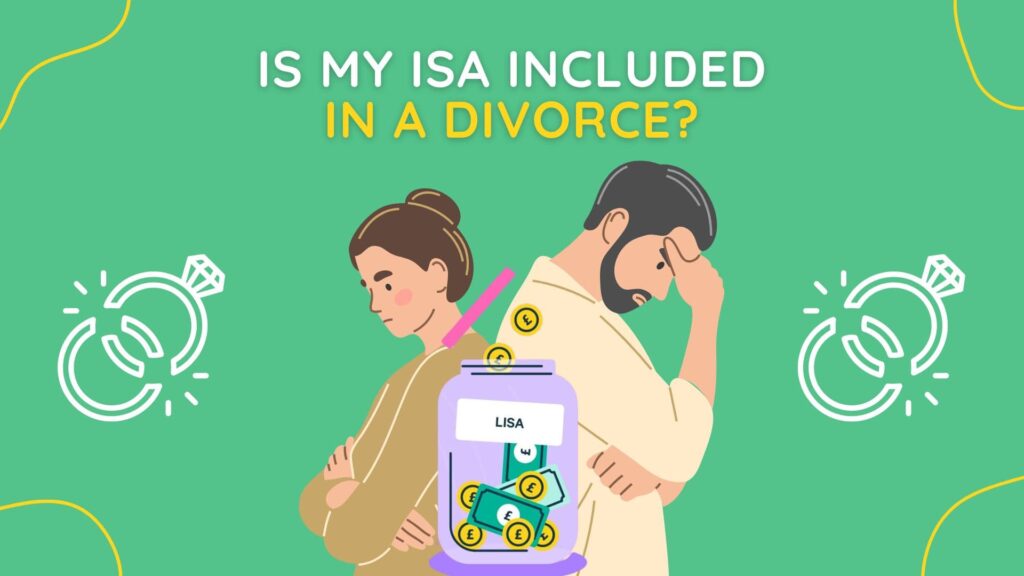
Sammie Ellard-King
I’m Sammie, a money expert and business owner passionate about helping you take control of your wallet. My mission with Up the Gains is to create a safe space to help improve your finances, cut your costs and make you feel good while doing it.

Quickfire Roundup:
In divorce settlements, ISAs are typically considered part of the overall asset pool subject to division. Cash ISAs and stocks and shares ISAs may be included in the division process, with cash ISAs often offset against other assets and stocks and shares ISAs requiring an accurate valuation.
Seeking professional advice from solicitors or financial advisors specialised in divorce is crucial to establish circumstances around joint financial assets. Non-matrimonial assets, acquired before the marriage or through inheritance/gifts, may have different treatment.
To protect assets, consider prenuptial or postnuptial agreements, maintain separate finances, thorough financial records, and seek legal guidance. Read on to find out more about protecting your assets from a financial settlement.
Divorce can be a challenging and emotional process, and it’s essential to consider the financial implications. One aspect that often arises is the treatment of Individual Savings Accounts (ISAs) in divorce settlements.
Understanding how ISAs are handled can help you make informed decisions about your finances.
In this article, we will explore the inclusion of ISAs in divorce settlements, providing you with valuable insights and guidance.
So buckle up as we dive into ‘Is My ISA Included In A Divorce?’
Table of Contents
Understanding ISAs
ISAs (individual savings account) are a popular savings option in the UK, offering tax-efficient ways to grow your money.
They provide a range of benefits, including tax-free interest or investment returns. Cash ISAs are suitable for those who prefer low-risk savings, while stocks and shares ISAs allow you to invest in the market.
If you want to learn more about ISAs we have an article called ISAs for Beginners available for you to read.
Financial Implications of Divorce

Divorce can involve the division of assets, and it’s crucial to assess the value of all your holdings, including your ISAs.
By understanding the potential impact of divorce on your ISAs, you can protect your financial interests and ensure a fair settlement.
Keep in mind that the court will consider various factors, such as the duration of your marriage and the financial needs of both parties when determining the division of assets.
Is My ISA Included In A Divorce?
ISAs are generally considered part of the overall asset pool subject to division in divorce settlements.
Let’s delve into how cash ISAs and stocks and shares ISAs are typically treated:
Cash ISAs in a Divorce
Cash ISAs are savings accounts that are usually regarded as matrimonial assets and are subject to division.
During the settlement process, the value of your cash ISA may be offset against other assets, ensuring a fair distribution.
If you are instructed to you may have to withdraw the money even though you may consider it personal savings. Financial arrangements can be made and are subject to a financial agreement in the courts or via solicitors.
Stocks and Shares ISAs in a Divorce
Stocks and shares ISAs are also considered matrimonial assets in divorce settlements. Dividing these ISAs can be more complex, as their value fluctuates with market conditions.
An accurate valuation is crucial to ensure an equitable division which is usually conducted by a lawyer and/or a financial planner.
Consider seeking expert advice from financial professionals experienced in dealing with stocks and shares ISAs to navigate this process successfully.
Lifetime ISAs in a Divorce
Both Lifetime ISAs (LISAs) and pensions are considered assets in the event of a divorce. Pensions, in particular, often represent a significant asset, second only to the family home, and are typically divided during divorce proceedings.
While most divorces are resolved outside of court in the form of an amicable agreement, if the amount is contested, the judge will assess whether each party can maintain a similar lifestyle to what they had during the marriage.
Seeking Professional Advice
Navigating the complexities of divorce and the treatment of ISAs can be challenging. Seeking professional advice from a solicitor or financial advisor is highly recommended.
They can provide tailored guidance based on your unique circumstances, ensuring that your financial interests are protected throughout the divorce process and that any court costs are communicated.
Additionally, consult resources such as books, websites, or government publications that offer expert insights into divorce and financial matters.
Professionals will be able to communicate whether they believe assets are likely to be divided equally or if there are complications with your former spouse.
What are non-matrimonial assets in a divorce settlement?

Non-matrimonial assets in a divorce settlement refer to assets that are considered separate or non-marital, and may not be subject to equal division between spouses.
These assets are typically acquired or owned by one spouse before the marriage or obtained through inheritance, gifts, or personal injury settlements.
These assets can include:
Pre-marital assets: Assets owned by one spouse prior to the marriage, such as property, investments, or savings accounts.
Inherited assets: Assets received through inheritance, including cash, real estate, or valuable possessions.
Gifts: Assets given to one spouse during the marriage as gifts, such as property, artwork, or vehicles.
Personal injury awards: Compensation received by one spouse as a result of a personal injury claim.
While a non-matrimonial asset may be considered separate from the overall marital assets, the division of these assets can still be subject to negotiation and may depend on factors such as the length of the marriage, the financial needs of both parties and the overall fairness of the settlement.
FAQs
How can I protect my savings from divorce?
To protect your savings from divorce, it’s important to take proactive steps. Consider signing a prenuptial or postnuptial agreement that clearly outlines the division of assets, including your savings.
Keep your finances separate by maintaining individual bank accounts and refraining from commingling funds. Regularly contribute to retirement accounts and investments in your name to establish a strong financial foundation.
Am I entitled to my husbands savings in a divorce?
In a divorce, the division of assets, including savings, depends on various factors. Generally, marital assets, which include savings acquired during the marriage, are subject to division between both parties.
However, the specific entitlement to your husband’s savings will be determined by factors such as the length of the marriage, financial contributions of each spouse, and individual needs.
Seeking advice from a solicitor or family law professional will provide you with personalised guidance based on your circumstances and help determine your entitlement to your husband’s savings during the divorce proceedings.
How do I avoid losing assets in a divorce UK?
To take steps to protect your assets in a divorce in the UK, consider the following strategies:
Prenuptial or Postnuptial Agreement: Consider entering into a legally binding agreement with your spouse that outlines the division of assets in case of divorce. A well-drafted prenuptial or postnuptial agreement can provide clarity and help protect your assets.
Separate Finances: Keep your finances separate by maintaining individual bank accounts and refraining from commingling funds. Clearly document any separate property or assets acquired before the marriage or through inheritance or gifts.
Financial Records: Maintain thorough and organized financial records, including bank statements, investment accounts, property deeds, and other relevant documents. These records can help substantiate your claims and protect your assets during the divorce process.
Seek Legal Advice: Consult with a family law solicitor who specializes in divorce to understand your rights and options. They can guide you through the legal process, provide personalized advice, and help protect your assets.
Full Disclosure: Be transparent and provide complete and accurate financial disclosure during the divorce proceedings. Hiding or undervaluing assets can have severe legal consequences and negatively impact the outcome.
Mediation or Collaborative Law: Consider alternative dispute resolution methods such as mediation or collaborative law. These approaches can help reach mutually agreeable settlements, reducing the risk of asset loss through costly litigation.
Asset Valuation: Obtain professional valuations for assets like properties, businesses, investments, and pensions to ensure accurate assessment and equitable distribution during the divorce proceedings.
Financial Planning: Work with a financial advisor experienced in divorce matters to develop a comprehensive financial plan. They can help you assess your long-term financial goals, manage assets, and protect your financial interests.
Do you pay capital gains tax on matrimonial property?
In the context of capital gains tax (CGT) in the UK, the treatment of matrimonial property depends on various factors.
During the marriage, the transfer of assets between spouses is generally exempt from CGT. However, if the transfer occurs after the end of the tax year in which the couple separated, it may be subject to CGT.
In situations where a matrimonial property is being sold, CGT may apply if there is a gain in value from the time it was acquired. The gain may be subject to CGT if it exceeds the annual tax-free allowance, known as the Annual Exempt Amount.
It’s important to note that specific circumstances and exemptions can apply, and tax rules are subject to change.
Consulting a tax specialist or accountant who is knowledgeable in family law and tax matters can provide accurate and up-to-date advice based on your specific situation.
They can guide you on the CGT implications of matrimonial property and help you understand your tax obligations.
Conclusion
Divorce is a significant life event that necessitates careful consideration of your financial well-being. Understanding the treatment of ISAs in divorce settlements is crucial to protect your assets and securing a fair outcome.
Take the time to educate yourself on the implications and seek professional advice to make informed decisions.
Remember, each situation is unique, and professional guidance tailored to your circumstances is essential. By being proactive and well-informed, you can navigate the complexities of divorce with confidence and safeguard your financial future.
So, I hope this answers the question of is my isa is included in my divorce settlement and if you now have a better understanding of how your financial assets will be handled.
Share on social media
Disclaimer: Content on this page is for informational purposes and does not constitute financial advice. Always do your own research before making a financially related decision.



